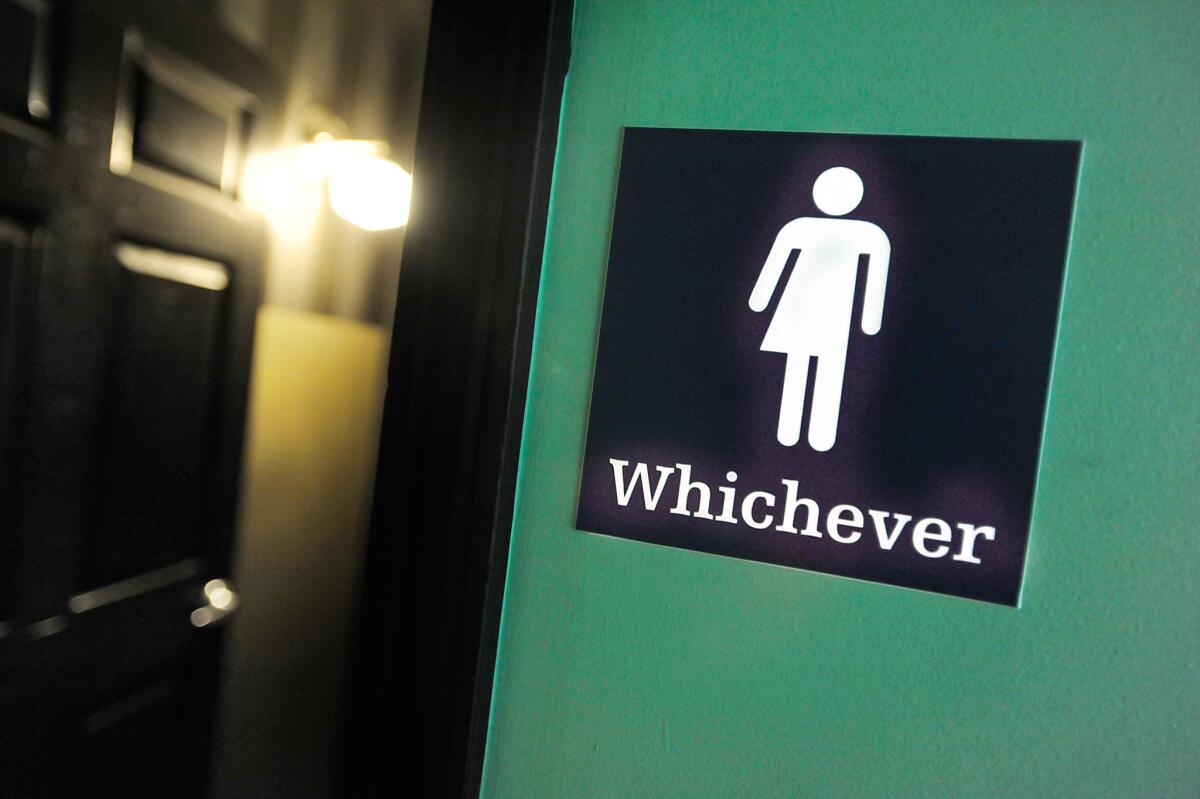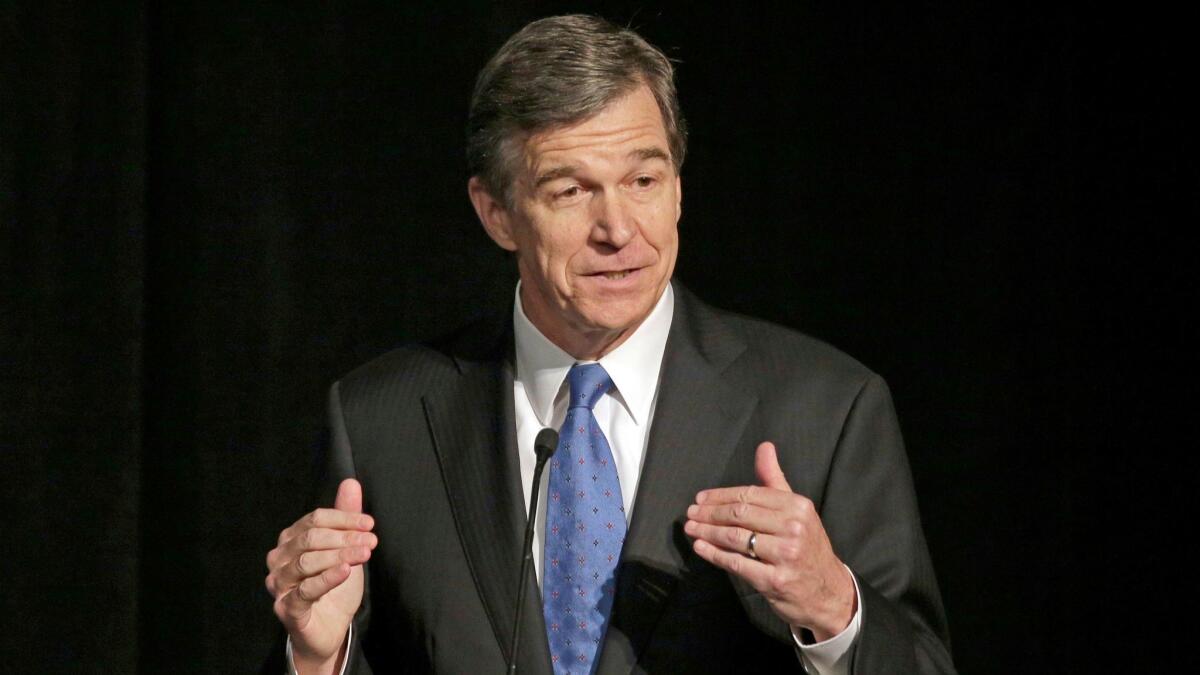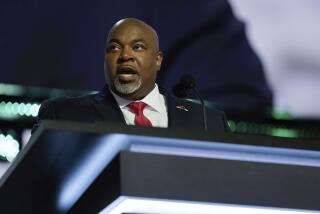North Carolina lawmakers fail to repeal contentious bathroom law

- Share via
Reporting from Raleigh, N.C. — It was billed as an opportunity to end the nation’s most bitter political stalemate over LGBT rights. Yet as dusk fell on North Carolina’s Capitol on Wednesday, legislators refused to repeal House Bill 2, which limits transgender bathroom access and curbs legal protections for lesbian, gay, bisexual and transgender people.
On Monday, Gov.-elect Roy Cooper, a Democrat, announced that Republican House and Senate leaders had assured him that after the city of Charlotte repealed its anti-discrimination ordinance, a special session would be called to “repeal HB2 in full.”
Yet after hours of intense backroom maneuvering Wednesday, legislators in the Senate offered only a compromise bill that repealed HB2 while introducing a moratorium, or “cooling-off period,” that would prevent local governments across the state from crafting or changing anti-discrimination ordinances
After 5:30 p.m., the House voted 58 to 45 to adjourn, ignoring the pleas of two Democratic representatives. The Senate did the same less than an hour later.

“I can’t bring myself in good conscience to leave this building without a full and unequivocal repeal of House Bill 2,” said Chris Sgro, a gay Democratic representative who is executive director of the advocacy group Equality NC. “If we adjourn, we are clear on who is playing politics with the people of North Carolina.”
Earlier, Senate leader Phil Berger had tried to persuade Democrats and Republicans to compromise.
“It’s a very simple bill, and the concept is that we have to take the state back to the status quo before Charlotte passed its ordinance,” Berger said Wednesday morning as he introduced the compromise bill. “This is the right thing to do for our state. It gives everyone an opportunity to start over.”
One by one, a parade of Democrats in the Senate stood up on the floor to oppose Republican bills and amendments, accusing senators of betrayal and trickery.
“This wasn’t the deal,” said Sen. Jeff Jackson, who argued that Charlotte officials had acted in good faith in overturning its ordinance before the special session. “This bill breaks that deal.”
“It’s smoke and mirrors, a mirage,” Democratic Sen. Angela Bryant said to Republicans, criticizing another amendment that extended the moratorium on future ordinances from six months to more than a year. “I don’t know if you think the public is stupid.”
The upper galleries of the House and Senate chambers were packed with hundreds of activists and campaigners as Democrats railed against conservative, rural legislators who had supported HB2 and now seemed to be reneging on a repeal.
Why a repeal of North Carolina’s bathroom bill comes with a price for LGBT advocates »
Republicans maintain strong majorities, with veto power, in the House and Senate. A repeal would have required moderate Republicans to side with Democrats, and a number of Democrats to switch positions: In March, 11 rural Democrats supported HB2, allowing the bill to pass the House by a 82-26 vote.
As the House and Senate declared recess after recess, Republican legislators spent hours huddled behind closed doors.
Outside the chambers, protesters held up placards saying, “Y’all means all” and “Full repeal and go home.”
The standoff over LGBT rights began in February when Charlotte, the state’s largest city, passed an ordinance that expanded nondiscrimination protections to include sexual orientation and gender identity and allowed people to choose restrooms according to the gender with which they identify.
Swiftly, Republicans rushed through the law, formally known as the Public Facilities and Privacy Security Act, which orders schools and public agencies to require multiple-occupancy restrooms to be used by people based on the sex listed on their birth certificate. The law also prevents cities from extending anti-discrimination laws to LGBT people and from passing any increase in the $7.25 minimum wage.
The prospect of a repeal came Monday when Charlotte’s predominantly Democratic City Council announced it had voted to rescind part of its ordinance prohibiting discrimination based on sexual orientation, gender expression and gender identity.
Charlotte’s abrupt turnaround shocked many Republicans and LGBT activists. In May, the City Council had refused to repeal the ordinance in exchange for the state modifying HB2, arguing it would not compromise LGBT rights. In September, when legislators offered to repeal HB2 entirely if the city repealed its ordinance, Mayor Jennifer Roberts again declined to make the first move.
Many hoped a repeal would offer a rare show of unity and bipartisanship between Democrats and Republicans, capping off a year of intense acrimony. After a razor-thin gubernatorial election, Republican Gov. Pat McCrory refused to concede to Cooper for nearly a month. And last week, the Capitol was the scene of angry protests as Republican leaders organized a special session to pass two laws designed to rein in Cooper’s powers when he becomes governor Jan. 1. Cooper in turn threatened a lawsuit.
Yet it was not to be. At the end of the day, both sides traded recriminations.
“Today, the legislature had the chance to do the right thing for North Carolina and they failed,” Cooper, the governor-elect, said at a late-night news conference. “Republican legislative leaders have broken their word to me and they have broken their trust with the people of North Carolina.”
Although Democrats railed at Republican leaders for failing to bring their caucus into line, Republicans in turn blamed Democrats for steadfastly rejecting any repeal that would have included a moratorium on cities passing nondiscrimination ordinances.
Republicans also lashed out at Charlotte’s leaders for only partially repealing their ordinance on Monday, a fact that some Republicans cited as a sticking point — even after the City Council reconvened Wednesday morning for an emergency meeting to fully repeal changes it made in February.
“We were told that Charlotte had repealed and it turned out they had not,” House Rules Chairman David Lewis said after the House adjourned, noting that this had made it more of a challenge for him to persuade wary Republicans to trust the city. “I can’t tell you what a huge hurdle that was.”
Unlike the city’s partial repeal on Monday, its fuller repeal on Wednesday was no longer contingent on legislators overturning HB2, a fact that ultimately took away some of the urgency for legislators to act.
Republicans resistant to repealing the law also got encouragement at the beginning of the day when Lt. Gov. Dan Forest spoke out against a repeal.
“No economic, political or ideological pressure can convince me that what is wrong is right,” Forest said in a statement. “It will always be wrong for men to have access to women’s showers and bathrooms.
“With certainty, if HB 2 is repealed, we will fight this battle all over again with another city or county. The names will change, but the national groups who are pushing this agenda will not stop until their social engineering is accomplished.”
Although a group of rural legislators seemed reluctant to repeal HB2 on moral or ethical grounds, some business-minded Republicans were open to repealing HB2 on the basis that the law hurt the state’s economy and reputation.
HB2 triggered an overwhelming backlash across the nation, generating boycotts and strong opposition from major corporations including Apple and Google. PayPal abandoned its plan to bring 400 jobs to the state, entertainers such as Bruce Springsteen canceled concerts, and the NBA relocated its All-Star game from Charlotte.
“Deep in the bones of the state is a yearning to be a strong economic entity,” said Ferrel Guillory, the director of the Program on Public Life at the University of North Carolina at Chapel Hill. “At root, both Democrats and Republicans, even in their stark differences, put economic development first.”
At the end of the day, however, Republicans and Democrats seemed wholly divided on the prospects of a future repeal.
“I think today was our best shot,” said Brian Turner, a Democratic representative. “I don’t think there’s going to be another opportunity.”
Republican leaders, he argued, just could not seem to whip their representatives into line.
“Through gerrymandering, there are now Republican seats that are so safe that the leadership has lost the ability to control them. It’s almost like a Frankenstein’s monster,” Turner said.
Still, some Republican leaders said they would be committed to working out a solution in the new year.
“It’s a high priority for me and it’s a priority for many Republicans,” Lewis, the House rules chairman, said after the House adjourned. “We in the state of North Carolina are going to find a way to respect everyone’s basic human rights.
“You know, I am a Republican, and our party was founded and grew under the belief that everyone’s entitled to equal protection under the law,” he said. “Somehow we can find a way to craft legislation to find a solution.”
Jarvie is a special correspondent.
ALSO
The artist and the senator: One built a desert masterpiece, the other a Nevada legacy
Why one Colorado school district voted to let teachers carry guns to class
Where fake news came from — and why some readers believe it
UPDATES:
8:25 p.m.: This article was updated with additional details and analysis on the failure to reach agreement for repeal of HB2.
3:45 p.m.: This article has been updated with news that North Carolina lawmakers adjourned for the night without repealing the bathroom law.
12:15 p.m.: This article has been updated with Republican Senate leader Phil Berger calling for a six-month “cooling-off period.”
11:15 a.m.: This article has been updated with the latest details of the special session hearing on HB2.
8:15 a.m.: This article has been updated with the session’s starting and with Charlotte repealing its entire anti-discrimination measure.
This article was originally posted at 7:05 a.m.
More to Read
Sign up for Essential California
The most important California stories and recommendations in your inbox every morning.
You may occasionally receive promotional content from the Los Angeles Times.











